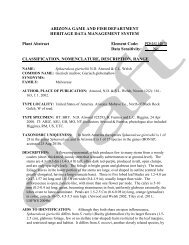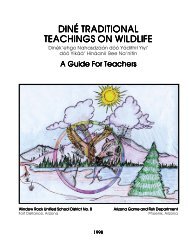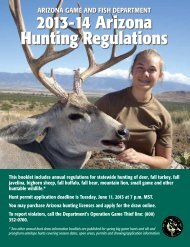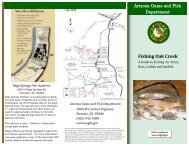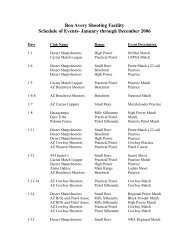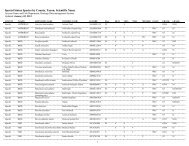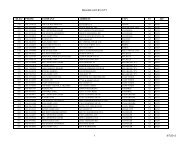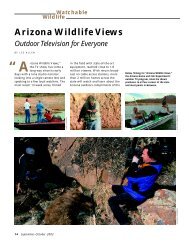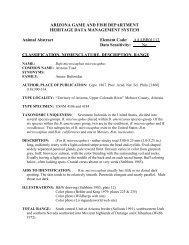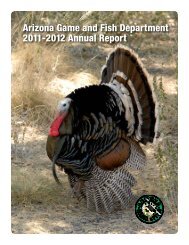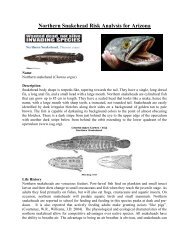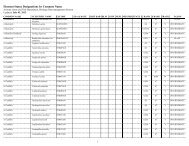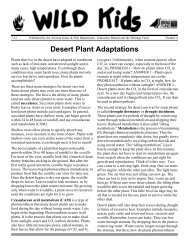PDF, 7mb - Arizona Game and Fish Department
PDF, 7mb - Arizona Game and Fish Department
PDF, 7mb - Arizona Game and Fish Department
You also want an ePaper? Increase the reach of your titles
YUMPU automatically turns print PDFs into web optimized ePapers that Google loves.
<strong>Fish</strong> Consumption <strong>and</strong> Your Health<strong>Fish</strong>ing is a great way to spend time with friends <strong>and</strong> family. Eatingfish is a contributor to your overall health <strong>and</strong> is an excellent sourceof protein <strong>and</strong> omega-3 fatty acids, which benefit heart health. theAmerican heart Association recommends eating fish at leasttwice a week.However, some types of fish (store-bought or sport-caught) fromsome locations, may contain elevated levels of mercury or otherenvironmental contaminants. The amount of these substances in thefish’s flesh is generally highest in older, larger, predatory fish.The benefits <strong>and</strong> risks of eating fish vary depending on a person’sstage of life:• Children <strong>and</strong> pregnant women are advised by the U.S. Food <strong>and</strong>Drug Administration (FDA) to avoid eating fish with high levels ofmercury contamination.• For middle-aged <strong>and</strong> older men <strong>and</strong> postmenopausal women, thebenefits of fish consumption far outweigh the potential risks whenthe amount of fish eaten is within the recommendations establishedby the FDA <strong>and</strong> Environmental Protection Agency (see EPAwebsite www.epa.gov/waterscience/fish/publicinfo.html).<strong>Fish</strong> consumption guidelines are primarily designed to protect pregnantwomen, women of child bearing age, children <strong>and</strong> anglers whoregularly consume fish in larger quantities over long periods of time.this information is not intended to discourage you from eatingfish but to guide you in making healthy choices. Don’t stop eatingfish; just be careful of the fish <strong>and</strong> amounts you eat, <strong>and</strong> where theycome from.Working with the <strong>Arizona</strong> <strong>Department</strong> of Environmental Quality, the<strong>Arizona</strong> <strong>Game</strong> <strong>and</strong> <strong>Fish</strong> <strong>Department</strong> investigates areas where theremay be concern for environmental contaminants in fish. In <strong>Arizona</strong>,mercury <strong>and</strong> pesticides have been found in several waters affectingvarious species. Based on these investigations, site-specific publicadvisories from the <strong>Arizona</strong> <strong>Department</strong> of Health Services <strong>and</strong> the<strong>Department</strong> of Environmental Quality have been developed, <strong>and</strong>anglers are advised to limit the consumption of certain kinds of fishfrom these locations.Please examine the Site Specific <strong>Fish</strong>Consumption Advisories table (at right).Health <strong>and</strong> Environmental InformationPreventing the Spread of Whirling DiseaseWhirling disease is a parasitic infection that attacks juvenile trout,eventually killing them. The disease is transmitted primarily byinfected fish or fish parts, or fishing equipment <strong>and</strong> wading gear.Whirling disease is not a human health concern. The <strong>Arizona</strong><strong>Game</strong> <strong>and</strong> <strong>Fish</strong> <strong>Department</strong> continues to monitor <strong>and</strong> test for anypresence of the disease.you can help prevent the spread of whirling disease in the followingways:• Do not transport live fish or fish parts from one body of waterto another.• Rinse all mud <strong>and</strong> debris from equipment <strong>and</strong> wading gear,<strong>and</strong> drain water from boats before leaving the infected water.• Allow gear to dry thoroughly before next use.For more information, visit the Initiative’s website atwww.whirlingdisease.montanta.edu.Lead <strong>and</strong> <strong>Fish</strong>ingSome kinds of fishing equipment such as sinkers <strong>and</strong> jigs are madefrom lead, which can be dangerous to the health of humans <strong>and</strong>wildlife. you can reduce your exposure to lead from fishing equipmentby following a few simple guidelines:• Never put lead in your mouth (use pliers to close sinkers aroundfishing line).• Don’t touch or eat food after h<strong>and</strong>ling lead fishing equipmentwithout washing your h<strong>and</strong>s first.• Don’t let small children h<strong>and</strong>le lead fishing equipment.Some birds have been poisoned byeating lead fishing equipment becausethey mistake it for food. Although thereis little evidence that this occurs oftenin <strong>Arizona</strong>, you can help to assurethat this does not happen. To preventwildlife exposure to lead:• Consider using alternatives to lead when you purchase fishingequipment (steel, bismuth, tungsten, resin, or glass weights).• Make reasonable attempts to recover any lost equipment madefrom lead.• Clean up any lead fishing tackle you find on shore or in theshallows.46 <strong>Arizona</strong> <strong>Game</strong> <strong>and</strong> <strong>Fish</strong> <strong>Department</strong> • www.azgfd.gov



